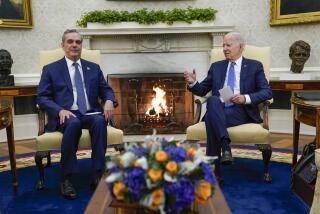Top Banker Is Optimistic on Latin America : Economics: The head of the Inter-American Development Bank says a shift in attitudes is attracting billions in capital to the region.
- Share via
SAO PAULO, Brazil — The president of the Inter-American Development Bank said Tuesday that he is “serenely optimistic” about the economic future of Latin America.
Enrique V. Iglesias told a meeting of the Interamerican Press Assn. that he believes that the region is at least pulling out of the slump of the 1980s, in which it slipped backward 13 years in overall living standards.
Some countries fell back 25 years, he said.
Iglesias said the region’s overall economic output is expected to rise by 2.4% this year. But officials of the Washington-based bank, which promotes the economic development of its developing-country member nations, said the region’s output would be up 4.4% this year were it not for the stagnation in the gross national product of the giant Brazilian economy. And the bank’s figures were predicated on a gradual U.S. recovery from recession this fall.
Population growth should be down to less than 2% a year by the end of the decade, he said, from a rate of 3% two decades ago.
Iglesias said a study has revealed that from 1900 to 1987 Latin America (starting from a low base) actually led the regions of the world by growing economically at an average yearly rate of 3.8%.
But in the 1980s, he said, the Latin American economy stalled, then slipped backward, for three principal reasons: tolerance of inflation, protectionist trade policies and the worsening of the centuries-old problem of gross disparities in income distribution. One-third of the region’s people now live in critical poverty, he said.
Yet the very troubles of the 1980s, Iglesias said, produced in Latin America a “silent revolution” that created a “profound transformation” in which public opinion turned against toleration of inflation, toward the privatization of state-controlled enterprises and against protectionism.
This shift of attitude, he said, brought a net inflow of $10 billion of capital in 1990 for the first time since 1983. In the years between, there was a net transfer of capital out of the region of between $20 billion and $30 billion a year, he said.
The recovery will take time, he said, and its slowness will put great strain on the political consensus developing in support of the kind of reforms he described.
Iglesias cited Mexico, Chile and Argentina as nations in which a general political and economic agreement across segments of society is beginning to produce, or will shortly produce, a rise in living standards for all.
When Eastern European communism collapsed, many Latin Americans feared that they would lose in the race for scarce capital. Iglesias said the new perception of the difficulties of Eastern European development have eased Latin American fears somewhat on that point.
Iglesias suggested that in spite of widespread underemployment in Latin America, it could benefit again, as it had in the past, from a policy of favoring “selective immigration” for skilled Europeans.
More to Read
Sign up for Essential California
The most important California stories and recommendations in your inbox every morning.
You may occasionally receive promotional content from the Los Angeles Times.












